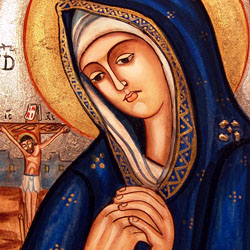Here’s
another poem by this year’s poetic focus, Robert Lowell, and I wanted to post
this poem in this month of May since May is Mary’s month, and this poem at its
core has a prayer to the Blessed Mother.
The poem was published in 1946, and I would guess it was written toward
the latter part of World War II. I
mentioned in my introductory post on Robert Lowell that he was a conscientious
objector to the war, and a strong anti-war proponent after the war.
The Dead in Europe
By Robert Lowell
After the planes
unloaded, we fell down
Buried together,
unmarried men and women;
Not crown of thorns, not
iron, not Lombard crown,
Not grilled and spindle
spires pointing to heaven
Could save us. Raise us,
Mother, we fell down
Here hugger-mugger in the
jellied fire:
Our sacred earth in our
day was our curse.
Our Mother, shall we rise
on Mary’s day
In Maryland, wherever
corpses married
Under the rubble, bundled
together? Pray
For us whom the
blockbusters marred and buried;
When Satan scatters us on
Rising-day,
O Mother, snatch out
bodies from the fire:
Our sacred earth in our
day was our curse.
Mother, my bones are
trembling and I hear
The earth’s
reverberations and the trumpet
Bleating into my
shambles. Shall I bear,
(O Mary!) unmarried man
and powder-puppet,
Witness to the Devil?
Mary, hear,
O Mary, marry earth, sea,
air and fire;
Our sacred earth in our
day is our curse.
Let
me provide a short analysis because this poem illustrates why Lowell is such a fine
poet, and as I said before the finest American poet in the post WWII era. This is not a poem in Lowell’s confessional
style, and yet it has a conversational tone that belies its highly stylized
form. There are three stanzas of seven
lines each written in iambic pentameter.
The first five lines have a rhyme scheme of ABABA and the sixth and
seventh lines ending with the same word in each stanza: “fire” in the sixth and
“curse” in the seventh. Actually the
seventh line is repeated in each stanza as a hymnal chorus, carrying enormous
power: “Our sacred earth in our day is our curse.” The poem uses two conceits which expounds its
theme, the image of being buried as a result of the bombs, and the metaphor of
marriage to suggest a harmonious resolution.
Let me try to flesh that out. The
bombs burry “the unmarried men and women,” not unmarried to each other but unmarried
to a broken, dissonant world. Each
stanza appeals to the Blessed Mother to resolve this fragmentation and marry humanity
to the four elements that was in classical times supposed to compose the
material world, earth, water, air, and fire. The war of his day is a curse stemming from
the fall from Eden. Marriage is not a literal
sacramental marriage but a metaphoric bringing to unity. Excellent poem.
We
may not be in a world war but the times today are pretty bad and worthy of such
prayer. Blessed Mother pray for this
broken world.


No comments:
Post a Comment